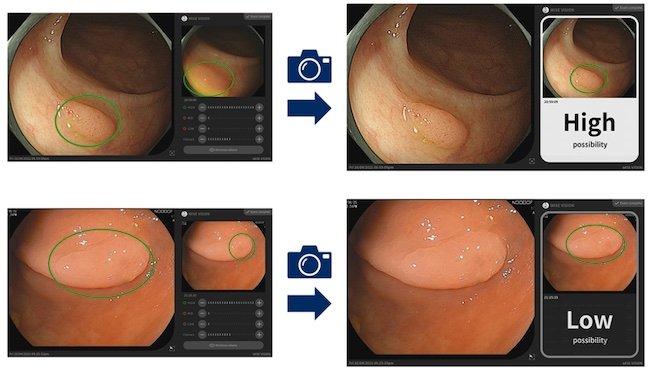
Image Caption: WISE VISION Endoscopy
Japan's NEC Corporation announced the development of an AI technology for supporting doctors in determining if colorectal lesions are neoplastic or non-neoplastic. NEC developed a new technology, called "Cx20," while seeking to assist in the early detection of colorectal lesions.
NEC and the National Cancer Center Japan have collaborated to develop this technology that automatically detects suspected colorectal lesions during endoscopy examinations.
Cx20 has already met the requirements for CE marking, a European safety, health and environmental protection standard, and will be integrated in the medical device AI diagnostic support software "WISE VISION Endoscopy", with sales expected to start in Europe later this year.
This software connects and interacts with existing endoscopic equipment and automatically notifies users if a lesion is possibly neoplastic based on images captured during endoscopy procedures. The software then becomes an extra tool immediately available to assist endoscopists in the differentiation of lesions and reduces the burden on patients.
Colorectal cancer originates from precancerous lesions (colorectal neoplastic polyps) and it is possible to suppress its progression by detecting and removing lesions at an early stage during endoscopy procedures. It is, however, sometimes difficult for endoscopists to visually distinguish between neoplastic and non-neoplastic lesions during endoscopy examinations, resulting in unnecessary biopsies and removal of non-neoplastic lesions, thereby causing additional stress and discomfort to patients. Colorectal cancer is said to be the second-largest cancer in the European region, and the latest version of WISE VISION Endoscopy, which launches first in Europe, promises to help doctors address this challenging issue.
To improve the chances of identifying if colorectal lesions are possibly neoplastic, and so to help endoscopists in their decision process, NEC developed a new technology where the learning power of AI is used to combine information of endoscopy images and data from the findings of expert physicians. Specifically, the technology analyzes still images of lesions taken with endoscopy devices, and if the AI determines that a colorectal lesion is likely to be neoplastic a "High possibility" notification message is displayed.




